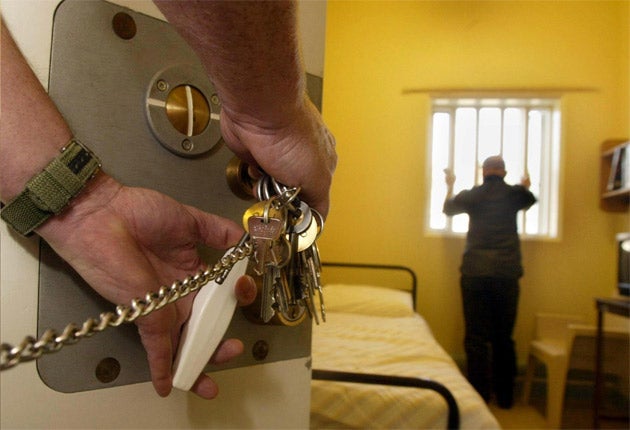Clarke's break with Tory prison policy provokes anger from right

Kenneth Clarke's pledge to break with the Conservatives' traditional "prison works" philosophy and bring in more community sentences has provoked anger from the right of his party and a warning from criminal justice campaigners that his words must be matched by firm proposals.
In a radical speech on penal reform yesterday, the Justice Secretary set out a new approach which he said would halt the record numbers of criminals being sent to prison in England and Wales.
He said he wanted to introduce a more open sentencing policy and to introduce a pay-by-results system for rewarding successful rehabilitation schemes in the community.
But there was little detail in his speech and any specific policy would have to wait for the end of a criminal justice review.
Juliet Lyon, director of the Prison Reform Trust, said: "Lack of money and the wreckage of a crisis-driven policy have come together to concentrate minds. Faced with an economically and socially unsustainable prison population, a sentencing review will allow the Justice Secretary and colleagues to adopt a moderate, informed approach to reform of the justice system."
Dominic Williamson of the Revolving Doors Agency, which works with prisons and the police to reduce reoffending, said that Mr Clarke would need support from across government if he was to achieve his goals.
Owen Sharp, deputy chief executive of Victim Support, said: "Steps to reduce reoffending are welcome. Victims want to see criminals stop committing crime and be rehabilitated. We know that short prison sentences are sometimes not the best way to achieve this and our research shows that victims of non-violent crime are receptive to community and other punishments if they work."
Mr Clarke's speech was followed by a damning report into one of Britain's oldest prisons, Dartmoor in Devon. Dame Anne Owers, Chief Inspector of Prisons, says in her report that the Category C prison has a poor record on education and vocational training. She says prison officers use homophobic language and a third of prisoners say they feel unsafe inside the jail.
Tory backbenchers reacted angrily to Mr Clarke's comments. Speaking in the Commons, Philip Davies warned that the Justice Secretary was out of step with ordinary people who had voted for the Tories.
"Lots of Conservative supporters, whether they be in Parliament or voters, will feel very disappointed by this announcement," he said.
Michael Howard, the Conservative former home secretary, told BBC Radio 4 that he remained unconvinced by the speech: "The prison population has gone up and crime has continued to fall. Short-term offenders are sent to prison because that's what the judge or magistrate thought was appropriate. This is something that the courts take a great deal of care over."
The shadow Justice Secretary Jack Straw accused Mr Clarke of a return to the "hand-wringing" approach to law and order of Mr Howard's Conservative predecessors as home secretary – including Mr Clarke himself. "He [Mr Howard] deserves credit for turning the tide, as does the Opposition leader at that time, Tony Blair, who encapsulated the need for a balanced policy with his call to be 'tough on crime, tough on the causes of crime'," he wrote in the Daily Mail.
"Now, though, in the crazy world of coalition Government, Kenneth Clarke shows he has learnt nothing about fighting crime in the time since he was in charge of prisons 17 years ago."
But David Cameron defended his Justice Secretary. The Prime Minister said the coalition Government had been forced to take radical action to deal with the "complete mess" that Labour had made of the the criminal justice system. Speaking at Prime Minister's Questions, he denied that the Government had abandoned Mr Howard's "prison works" philosophy. "I believe that prison can work, it is just not working properly at the moment. If ever there was a part of our public services that needed radical reform to make sure prison does work, that's it," he said.
Mr Clarke, who is carrying out a review of sentencing policy, described the current 85,000 prison population in England and Wales as "astonishing" and questioned whether it delivered value for money for taxpayers.
Keeping a prisoner in jail costs an average £38,000 a year – more than sending a boy to Eton – but often did no more than produce "tougher criminals" and introduce petty offenders to hardened felons, he said.
"There are some nasty people who commit nasty offences. They must be punished, and communities protected. My first priority is the safety of the British public," he said. "But just banging up more and more people for longer without actively seeking to change them is what you would expect of Victorian England."
Proposed reforms
* More transparent sentencing policy
* Paying criminal justice groups by results to reduce reoffending. They would have clear financial incentives to keep offenders away from crime
* A criminal justice review which would recommend specific policies
* Building new prisons to replace old ones
* Means testing for defendants who require legal aid to pay for legal representation
